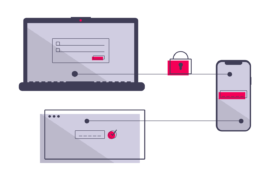Ad exchanges are marketplaces where ad impressions are sold and bought. And since the mechanism is programmatic, it spares both time and discrepancies in revenue generation.
However, even automated products can be manipulated and used for fraud.
A lot of ad impressions are lost to invalid traffic such as bots. In fact, fraudulent ad impressions can cost approximately $1.28 million dollars to businesses every day.
There’s also the case of infrastructural waste which occurs due to excessive steps in the programmatic supply chain. Oftentimes, due to lack of transparency in the programmatic ecosystem, bids are rejected by SSPs, further increasing inefficiency in the system.
For this reason, in 2018, six major ad exchanges committed to shared principles of programmatic marketplace, that they would abide by to run a seamless trade of ad inventory.
In this post, we will explain about these shared principles, how they came into existence, and what they mean for publishers.
History of Shared Principles of Programmatic Marketplace
Six major ad exchanges including OpenX, Rubicon Project, PubMatic, Sovrn, SpotX, and Telaria pioneered the shared principles.
They recognized that adoption of programmatic trade of ad inventory was inhibited by complexity and opaqueness in programmatic advertising.
They wished to eliminate this and expand participation from publishers and advertisers. They realized that this could only be done if a fair marketplace with 100% transparency came into existence.
This formed the basis of the shared principles of programmatic marketplace.
Hence, on 17th October, 2018, these six ad exchanges signed an open letter to publishers and advertisers.
And that’s how ad exchanges committed to the shared principles of programmatic marketplace.
The Shared Principles of Programmatic Marketplace
So the question arises, what are these shared principles exactly and how do they empower publishers and empowers in the programmatic marketplace?
The ad exchanges identified that for any marketplace to function effectively, three core principles are essential: Efficiency, Transparency, and Fair-market.
These three principles empower the technical invention, transactions, and communication that happens within the programmatic marketplace.
Let’s understand more about these principles:
Efficiency
The ad exchanges believes that if the programmatic marketplace is efficient in nature, it will conserve time and prevent fraud. Here’s how efficiency can be ensured:
- All ad creatives to be scanned for detecting malware
- All domains and apps to be reviewed for 4 important metrics: brand safety, audience quality, refresh rates, and ad counts
- All ad requests to be scanned in real-time to avoid invalid traffic
- Assured certification from Trustworthy Accountability Group
TAG looks forward to working with the broader industry to take these principles and develop a new certification, which will ensure brands, agencies, and publishers that their partners are committed to a fair, efficient, and transparent programmatic supply chain.
Mike Zaneis, president of TAG
- All ads to be Better Ads Standards compliant
- Only one unique bid to be sent to the DSPs for any new ad request from a publisher. This will be done to prevent infrastructure waste.
Transparency
Transparency is imperative for establishing more trustworthy partnerships between advertisers, publishers, and other participants in the advertising chain. Here’s how it can be ensured:
- All kinds of transactional fees to be explicitly stated

- All impressions, clicks, winning bids, and ad requests, to be audited at every step
- Any changes made in the marketplace interface that could impact buyers to be notified in advance
Fair-market
Fair-market is important for establishing rules that all participants in the marketplace must adhere to. This ensures that seamless transactions continue to take place. Here’s how this can be ensured:
- All bid requests to specify auction type (1st price or 2nd price)
- No rebates or kickbacks to be carried out which could divert spending from the marketplace
- Any biased activities such as non-transparent bid caching are strictly forbidden
What’s the Takeaway for Publishers?
For publishers, this is a step ahead. Many publishers often face loss of revenue due to fraudulent activities or infrastructural waste. If the platforms begin to take a stand and unite to make the programmatic marketplace a better place, it’s a win-win for everyone.
We wanted to take action ourselves, rather than have someone else tell us what to do, and we wanted to do it as a group, so that we can present a united front – a critical mass of companies, saying that we believe this is the right approach, and we will step up to it.
Tim Cadogan, ex-CEO of OpenX
Further, through the certification procured by the Trustworthy Accountability Group, we can be assured that many of these principles have been turned into practices.
Publishers who are willing to learn more about this can study these certificate courses to imbibe more knowledge:
- Certified Against Fraud
- Certified Against Malware
- Brand Safety Certified
Final Thoughts
In any business relationship, it’s important for transactions to be transparent and efficient in nature. Only then we can commit to reduction of fraudulent practices and infrastructural waste. Any time an entity (or group of entities) decides to ensure fair practices, it only inspires another.
For example, Google recently revealed their platform fee structure for DV360 and Google Ad Manager, further helping publishers in understanding their effective revenue structure.
As a Google Certified Publishing Partner, we have followed suit and made our products completely transparent and seamless for publishers. For more information, book a demo with us.

Shubham is a digital marketer with rich experience working in the advertisement technology industry. He has vast experience in the programmatic industry, driving business strategy and scaling functions including but not limited to growth and marketing, Operations, process optimization, and Sales.







